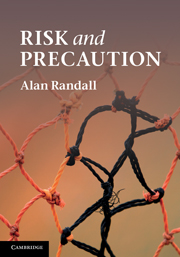Book contents
- Frontmatter
- Contents
- List of figures
- List of boxes
- Authors cited
- Acknowledgements
- List of acronyms
- Part I The precautionary principle – why so much fuss about such a simple idea?
- Part II Harm and chance – managing risk
- Part III Defining and justifying a coherent precautionary principle
- 6 A defensible precautionary principle must withstand these challenges
- 7 Toward a precautionary principle framework: evidence, threat, and remedy
- 8 Threat and evidence
- 9 Remedy
- 10 Precaution for utilitarians?
- 11 A robust and defensible precautionary principle
- Part IV Precaution in action
- Part V Conclusion
- References
- Index
8 - Threat and evidence
Published online by Cambridge University Press: 05 June 2012
- Frontmatter
- Contents
- List of figures
- List of boxes
- Authors cited
- Acknowledgements
- List of acronyms
- Part I The precautionary principle – why so much fuss about such a simple idea?
- Part II Harm and chance – managing risk
- Part III Defining and justifying a coherent precautionary principle
- 6 A defensible precautionary principle must withstand these challenges
- 7 Toward a precautionary principle framework: evidence, threat, and remedy
- 8 Threat and evidence
- 9 Remedy
- 10 Precaution for utilitarians?
- 11 A robust and defensible precautionary principle
- Part IV Precaution in action
- Part V Conclusion
- References
- Index
Summary
The ETR framework for a coherent precautionary principle relates evidence, threat, and remedy (Chapter 7). Among the desiderata for a coherent PP, the most basic are that it be neither foolish nor redundant. To avoid redundancy, PP remedies should include some that go beyond ordinary risk management (ORM); it follows that some (but, one would hope, not all) PP remedies may be costly and intrusive. Given that invoking the PP in any particular case may be a big step, two kinds of foolishness readily can be imagined: the injunction to avoid all risks is foolish because it is impossible in the real world, and even approaching it would be paralyzing; and a PP that can be invoked by unfounded panic would be obviously foolish.
In this chapter, these issues are addressed directly. I start with the threat (the chance of harm), asking what kinds of threats might justify precautionary remedies. Given that PP remedies include some that go beyond ORM, it makes sense that the PP focus on threats that are in some sense beyond the ordinary, that is, involve some combination of non-trivial chance and extraordinarily great possible harm. If the PP is directed to these kinds of threats, it is far from an injunction to avoid all risks.
We made a conceptual distinction (Chapter 7) between two kinds of chance – chance because real-world outcomes are unpredictable in some objective sense (not everything we need to know is knowable), and chance because we do not know everything that can be known.
- Type
- Chapter
- Information
- Risk and Precaution , pp. 109 - 133Publisher: Cambridge University PressPrint publication year: 2011



